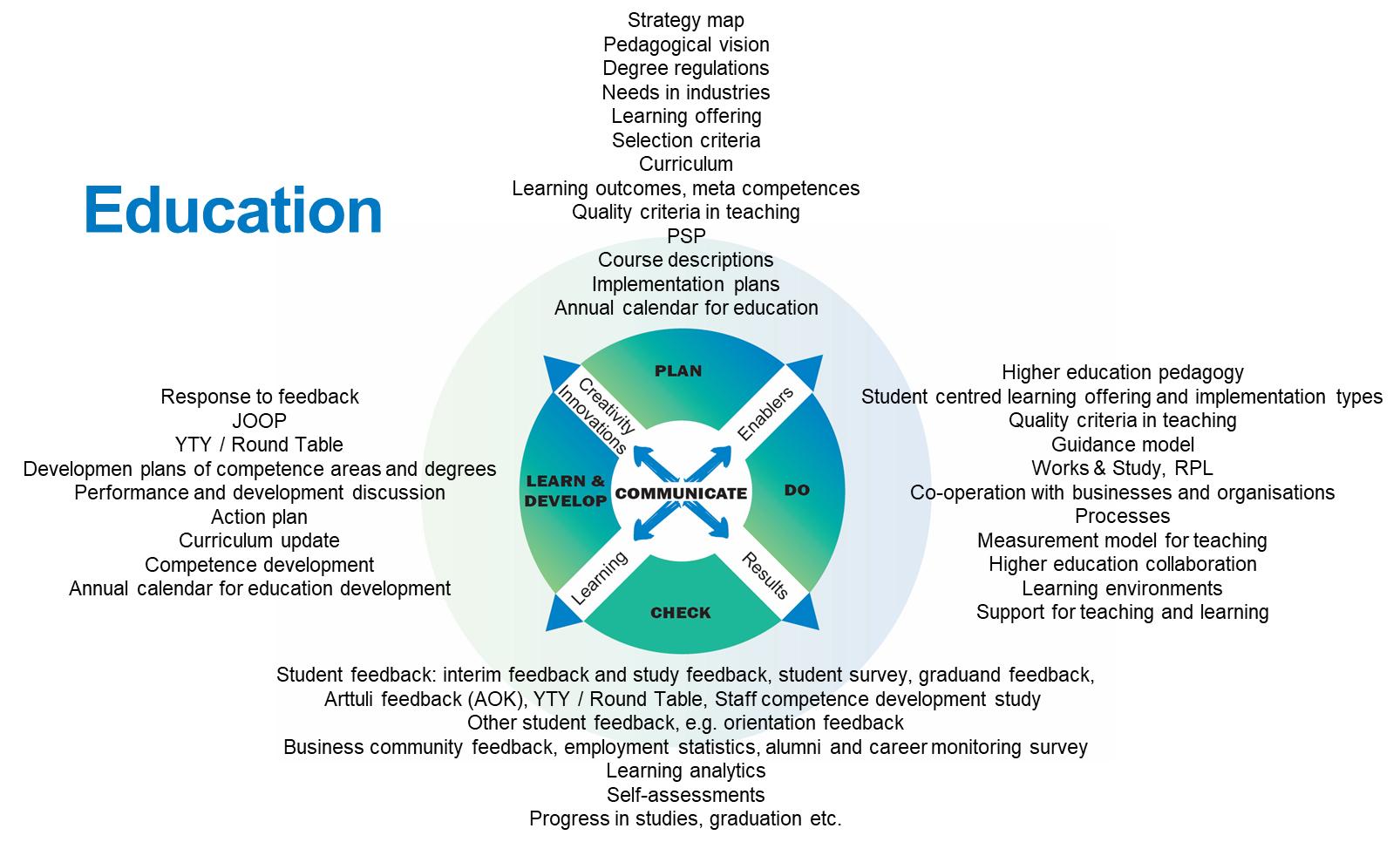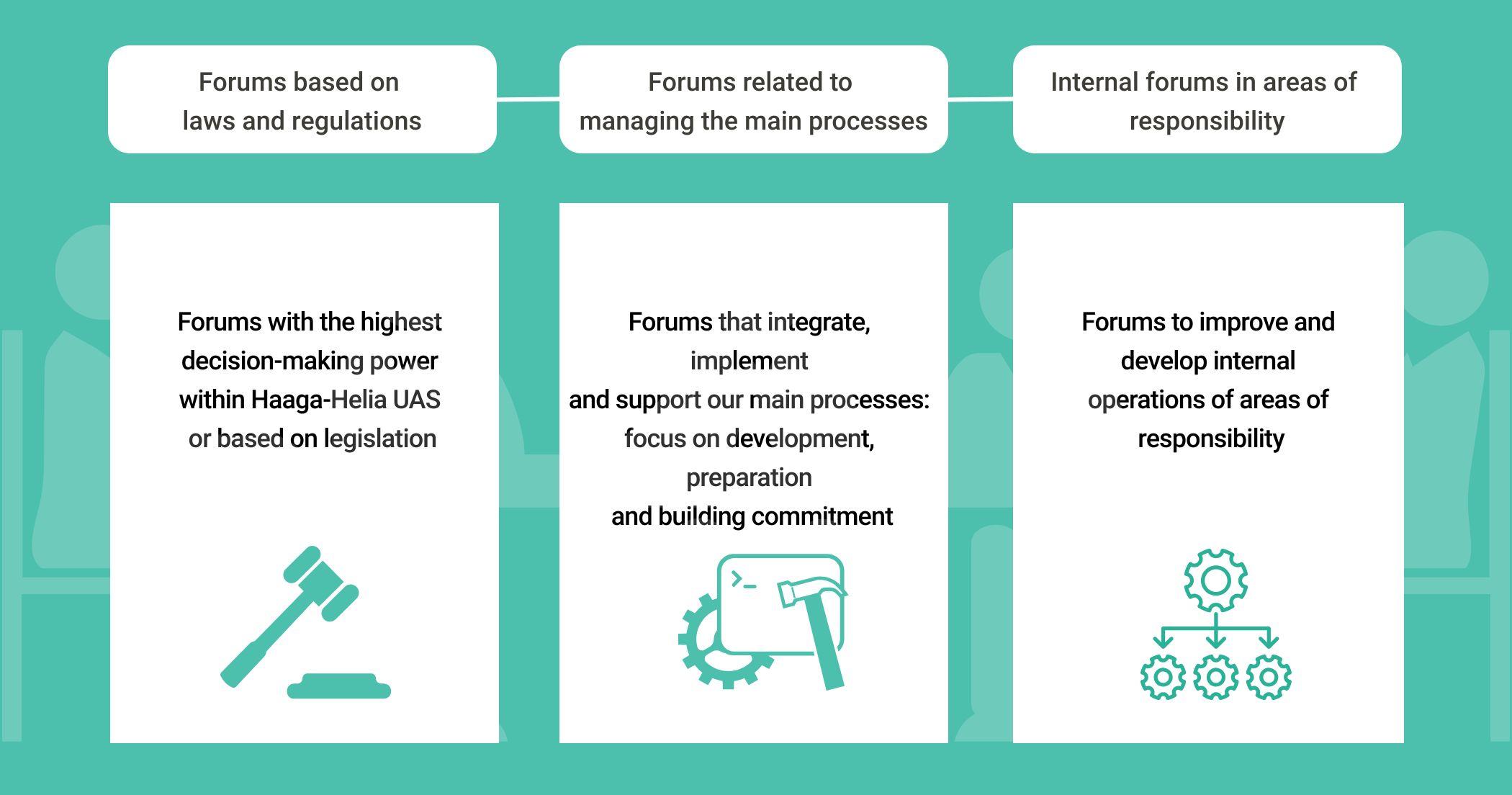Quality system supporting the enhancement of the core duties
Our common organisational management and quality system frame Plan-Do-Check-Learn&Develop-Communicate ensures the coverage of quality work through all core duties and the organisation. In addition, every core duty has its own specified steering elements, processes, indicators, feedback systems, and development forums to support the operations and development work aligned with strategic objectives set for the core duty.

Picture 24. Management and quality system in education
Responsibilities in quality development are embedded in organisational roles, official bodies, and development groups to cover the whole organisation. Each of them has an agreed area of responsibility and development objectives. The main task is the continuous development of operations based on results, feedback, and foresight work. All staff members participate in development groups as part of their team, group, or area of responsibility as well as horizontal groups over the organisational structure. These groups contribute to the development of a joined-up quality culture.

Picture 25. Framework of official forums and bodies
The quality system produces information for the development of all core duties, and the indicators help draw attention to strategically salient matters. The utilisation of results and feedback in development across the organisation could be enhanced still to further strengthen the impact.
Organisational structure and forums supporting the sharing of good practices
Good practices are disseminated in groups, forums, and on the organisational level. The new organisation promotes sharing practices by setting people into groups with similar or crossing competences enabling them to share and develop the competences further. Other methods for sharing good practices are cross-organisational and role-based groups and forums, events like Pedacoffee (pedagogy) and TuTKII (RDI) as well as online platforms e.g., Develop and share your expertise. The sharing of knowledge is monitored in the personnel survey.
Participatory development work promotes the sharing of good practices as part of the process, e.g., in the education reform good practices were gathered across the organisation to form the new structure of the curricula. Another broadly applied concept is the digipeda mentor model with teacher colleagues guiding and supporting the development of digital competences.
Joint development and open quality culture
We actively include internal and external stakeholders in our development work. Our personnel survey from 2021 indicates that the whole staff is committed to high quality, developing their expertise and continuous development. Change management in dialogue has enhanced the participatory culture. Education reform, new organisation and team-based teaching promote collaboration and joint development.
One of our strengths is that students are heard. Students are actively involved in appropriate development groups and official bodies. The Student Union and student organisations have open dialogue with the management and they meet in official JOOP-meetings four times a year. They are consulted on important issues and interact informally on a weekly basis. There are multiple possibilities for all students to participate in development by giving feedback, which is discussed openly in various forums with students and stakeholders. There are still challenges in getting feedback and it requires continuous encouragement. Shared information platforms and virtual participatory working models for both staff and students enhance the openness and shared quality culture.
Our connections with businesses and organisations are strong. Company representatives and our alumni are involved in development at a strategic level, in advisory boards, development groups, as well as sharing their expertise in teaching or RDI activities. Our national and international networks contribute to our quality work through joint development and benchlearning. External stakeholders’ inclusion as a systematic part of a shared quality culture requires continued attention to retain the achieved level of activity. We are proactively creating new ways to include stakeholders in our quality work.
Agile and holistic development of the quality system
We develop our quality system proactively based on external and internal, current and future needs with the help of feedback, assessments, benchlearning and external input. We evaluate and fine-tune our quality work continuously at the practical level; thus, the development of the quality system is dynamic and agile. We implement major changes in projects with wider impact assessment. The effects of changes are monitored through surveys, development forums, and feedback. We can further improve the systematic monitoring of the effectiveness of quality work.
Haaga-Helia’s quality system has been assessed as part of the organisation-wide self-evaluation (2009, 2016, 2022). The effectiveness is assessed based on our current ability to support the strategy and objectives. We recognised both our strengths and development needs, which we documented into development plans. The overall assessments will continue more frequently and systematically to ensure the required support for achieving our strategic goals.
| Strengths | Enhancement areas |
| Listening to students and stakeholders, and their active involvement in development work, development groups and official bodies | New organisation and education reform bringing new responsibilities and operational models, which are still evolving |
| Possibility for the staff to influence their own work as well as the development of Haaga-Helia, thus creating a dynamic organisational culture | Monitoring the impact of development actions becoming even more systematic and more widely communicated |
| Quality system covering the whole organisation and its development based on strategy and needs from the organisation | Continuous encouragement to develop continuous and open dialogue approach in feedback culture |